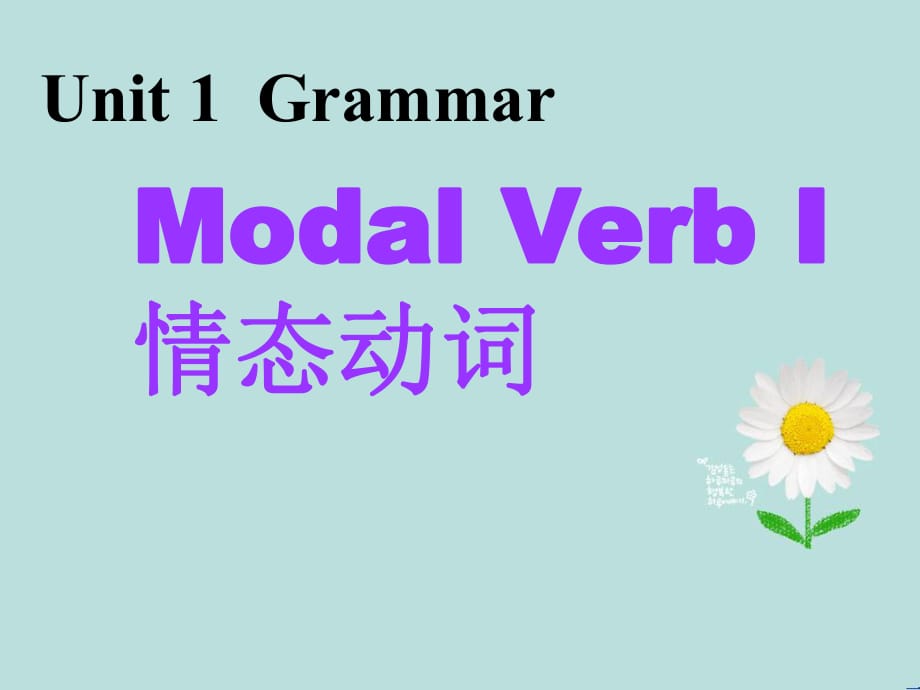《人教版高一英語(yǔ)英語(yǔ)必修3Unit1語(yǔ)法情態(tài)動(dòng)詞 (共35張PPT)》由會(huì)員分享����,可在線(xiàn)閱讀,更多相關(guān)《人教版高一英語(yǔ)英語(yǔ)必修3Unit1語(yǔ)法情態(tài)動(dòng)詞 (共35張PPT)(35頁(yè)珍藏版)》請(qǐng)?jiān)谘b配圖網(wǎng)上搜索��。
1��、Modal Verb I情態(tài)動(dòng)詞 Unit 1 Grammar 情 態(tài) 動(dòng) 詞 表 示 說(shuō) 話(huà) 人 的 某 種 感 情 或 語(yǔ) 氣 ����, 對(duì) 某 一 動(dòng) 作 或 狀 態(tài) 的 某 種 態(tài) 度 ����。表 示 “ 需 要 ���、 可 以 ���、 必 須 、 應(yīng) 當(dāng) ” 等 �。 什 么 是 情 態(tài) 動(dòng) 詞 ? (Modal Verbs) Underline the modal verbs Most ancient festivals would celebrate the end of cold weather. It is now a childrens festival, when they can dress
2���、 up If the neighbors do not give any sweets, the children might play a trick on them. 7 /1 8 /2 0 2 1 3 Underline the modal verbs In European countries, people will usually decorate churches She would never forget him. At the Spring Festival in China, people may give children lucky money in red pape
3�、r. 7 /1 8 /2 0 2 1 4 情 態(tài) 動(dòng) 詞 的 語(yǔ) 法 特 征1. 情態(tài)動(dòng)詞不能單獨(dú)做謂語(yǔ),后接動(dòng)詞原形���。(除ought to; have to外) 2. 情態(tài)動(dòng)詞沒(méi)有人稱(chēng)��,數(shù)的變化���,但有 些情態(tài)動(dòng)詞(如can, will)有一般式 和過(guò)去式的變化。 Modal Verb I may/might can/could will/would shall/should must/cant 7 /1 8 /2 0 2 1 6 can的主要用法是: 1. 表示能力: eg. The girl can dance very well. 2. 表示說(shuō)話(huà)者的推測(cè)事物的可能性: eg. Can t
4����、he news be true? 3. 在口語(yǔ)中, 表示請(qǐng)求或允許: eg. Can I sit here? can和could could的主要用法: 1. could -can的過(guò)去式, 表示與過(guò)去 有關(guān)的能力或推測(cè): eg. I can speak fluent English now , but I couldnt last year. 2. could可以代替can表示請(qǐng)求, 但語(yǔ)氣較can客氣�����、委婉: eg. Could you lend me your dictionary? Could I use your bike? 用could 提問(wèn)�,答語(yǔ)用can (即:could 不能用
5���、于現(xiàn)在時(shí)態(tài)的答語(yǔ)中) -Could I borrow your pen? -yes, you can. can和be able to辨析can(could)和be able to都可以表示能力����,意思上沒(méi)有區(qū)別�。但can只有現(xiàn)在式和過(guò)去式��,而be able to則有更多的形式��。如: Those bags look really heavy, are you sure youll be able to carry them on your own? 2 0 2 1年7月1 8日星期日1 0 may和might may 的用法:1. 表示請(qǐng)求���、允許(比can較為正式) eg. May I come
6����、in ? You may go now.用may 提問(wèn)���,否定回答用 must not (mustnt) 禁止���、阻止 had better not 最好別 may not 不可以 May I smoke here?Yes, you may. No, you mustnt No, youd better not. No, you may not. 7 /1 8 /2 0 2 1 1 2 2. 表示說(shuō)話(huà)人的猜測(cè)(肯定句和否定句) 含有“也許”“大概” “可能”之意����。 My friend may arrive this afternoon. 3. 表示祝愿; 但語(yǔ)氣較正式: eg. May you s
7���、ucceed! May you have a good journey! might 的用法may 的過(guò)去時(shí)����,表示可能性時(shí)�,語(yǔ)氣顯得更加不確定。My friend might arrive this afternoon. 7 /1 8 /2 0 2 1 1 4 will和would Question: will/would 是助動(dòng)詞還是情態(tài)動(dòng)詞�����? will 構(gòu)成將來(lái)時(shí)-助動(dòng)詞����。 表示“意志”“決心”“請(qǐng)求”-情態(tài)動(dòng)詞。例: I will tell you something important. 我要告訴你一件重要的事情�。(助動(dòng)詞) Will you tell her that Im here
8、? 請(qǐng)您告訴她說(shuō)我在這兒�,好嗎?(情態(tài)動(dòng)詞) will 和 would的用法1���、表示請(qǐng)求�����、建議等���,用于第二人稱(chēng) (用would比will委婉) Will you please take a message for him? Would you please tell me your telephone number? 2 0 2 1年7月1 8日星期日1 6 2.表示習(xí)慣或傾向��, 意為“總是”�,“習(xí)慣于”�����。 eg: Fish will die without water. People will talk. (人們總會(huì)說(shuō)閑話(huà)���。) When we worked in the same offic
9、e, we would often have coffee together. shall和shouldshall 用法 表征求意見(jiàn)����,用于一、三人稱(chēng) �, (疑問(wèn)句) Shall we go by train, Mom? Shall he attend the meeting? shall和shouldshall 用法 2.用于二 、三人稱(chēng) 的陳述句中����,表威脅���、警告、命令���、允諾等語(yǔ)氣 He shall be sorry for it one day, I tell you. You shall do as I say. If your children dont do as I tell you
10�、, you shall not go to the party. (警告)(命令)(威脅) should 用法應(yīng)該=ought to (勸告���、建議) You should study hard. You should read his new book.2. 表估計(jì)���,可譯為“按理應(yīng)當(dāng)”、“估計(jì)”��。 Try phoning Robert, he should be home now. should 用法3. 用于第一人稱(chēng)�����,詢(xún)問(wèn)意愿��,語(yǔ)氣溫和委婉 Should I trust him? What should I do now?4. 萬(wàn)一���,用在if引導(dǎo)的條件句中��,表示一件事聽(tīng)起來(lái)可能性很小����,但也不
11、是完全不可能���?��;蛑苯佑糜诰涫住f I should be free tomorrow, Ill come.Should I be free tomorrow, Ill come. should 用法5. “居然”�����,“竟然”,表說(shuō)話(huà)人意料之外�����。 To my surprise, he should be a thief. Why should everyone want to marry Tony? must的主要用法 1. 必須�,應(yīng)該����。 語(yǔ)氣比should,ought to 強(qiáng)烈�����。 eg: Everybody must obey the law. You mustnt drive so fas
12、t in the street. 2. 表示有把握的猜測(cè)��?���!耙欢ā薄ⅰ皽?zhǔn)是”結(jié)構(gòu):must be eg: He must be an honest boy. 用must 提問(wèn)�,回答方式 肯定回答:yes, please / Im afraid so 否定回答 :neednt / dont have to -Must I come back before ten? -No, you neednt.表猜測(cè)的否定或疑問(wèn)句用can/could,不用mustnt. If Mary didnt leave here until 5:00, she cant be home yet. -_ I go out
13����、 to play, mum? -No, you_. You should do your homework first. A. Might; wouldnt B. May; had better not C. Must; mustnt D. Need; mustntExercise 2. -Where is Emma? -I cant say for sure where she is, but she_ be out shopping. A. can B. should C. must D. may 3. The room is in a terrible mess; it _ cleane
14、d. A. cant have been B. couldnt be C. may have been D. would be 4. There _ be any difficulty about passing the road test since you have practised a lot in the driving school. A. mustnt B. shant C. shouldnt D. neednt 1 Children under 12 years of age in that country _ be under adult supervision when i
15�、n a public library. (2004 上海) A. must B. may C. can D. need 2 Whats the name? Khulaifi. _ I spell that for you�����?(2006 北京) A. Might B. Would C. Can D. Shall 3 Some aspects of a pilots job_ be boring, and pilots often _ work at inconvenient hours. (2006 湖南) A. can�;have to B. may;can C. have to; may D.
16�、ought to; must 4 The weather turned out to be fine yesterday. I _ the trouble to carry my umbrella with me. (2006 江西) A should have taken B could have taken C neednt have taken D mustnt have taken 5 Hows your tour around the North Lake? Is it beautiful? It _ be, but it is now heavily polluted. (2007 全國(guó)I) A. will B. would C. should D. must 6 I told your friend how to get to the hotel, but perhaps I have driven her there. (2007 陜西) A. could B. must C. night D. should
 人教版高一英語(yǔ)英語(yǔ)必修3Unit1語(yǔ)法情態(tài)動(dòng)詞 (共35張PPT)
人教版高一英語(yǔ)英語(yǔ)必修3Unit1語(yǔ)法情態(tài)動(dòng)詞 (共35張PPT)

